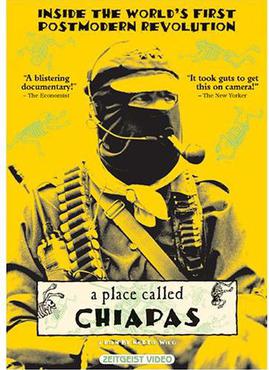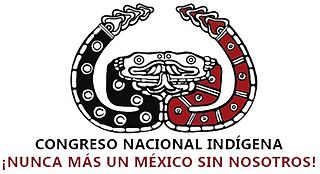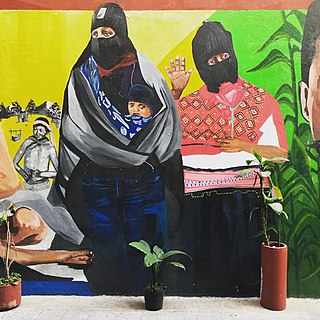Related Research Articles

Chiapas, officially the Free and Sovereign State of Chiapas, is one of the states that make up the 32 federal entities of Mexico. It comprises 124 municipalities as of September 2017 and its capital and largest city is Tuxtla Gutiérrez. Other important population centers in Chiapas include Ocosingo, Tapachula, San Cristóbal de las Casas, Comitán, and Arriaga. Chiapas is the southernmost state in Mexico, and it borders the states of Oaxaca to the west, Veracruz to the northwest, and Tabasco to the north, and the Petén, Quiché, Huehuetenango, and San Marcos departments of Guatemala to the east and southeast. Chiapas has a significant coastline on the Pacific Ocean to the southwest.

The Zapatista Army of National Liberation, often referred to as the Zapatistas, is a far-left political and militant group that controls a substantial amount of territory in Chiapas, the southernmost state of Mexico.

Samuel Ruiz García was a Mexican Catholic prelate who served as bishop of the Diocese of San Cristóbal de las Casas, Chiapas, from 1959 until 1999. Ruiz is best known for his role as mediator during the conflict between the Zapatista Army of National Liberation (EZLN) and the Institutional Revolutionary Party (PRI), a Mexican political party which had held power for over seventy years, and whose policies were often disadvantageous to the indigenous populations of Chiapas. Inspired by Liberation Theology, which swept through the Catholic Church in Latin America after the 1960s, Ruiz's diocese helped some hundreds of thousands of indigenous Maya people in Chiapas who were among Mexico's poorest marginalized communities.

The Lacandon jungle is an area of rainforest which stretches from Chiapas, Mexico, into Guatemala. The heart of this rainforest is located in the Montes Azules Biosphere Reserve in Chiapas near the border with Guatemala in the Montañas del Oriente region of the state. Although much of the jungle outside the reserve has been cleared, the Lacandon is still one of the largest Montane forest|montane rainforests in Mexico. It contains 1,500 tree species, 33% of all Mexican bird species, 25% of all Mexican animal species, 56% of all Mexican diurnal butterflies and 16% of all Mexico's fish species.

Anarchism in Mexico, the anarchist movement in Mexico, extends from Plotino Rhodakanaty's organization of peasant workers in the 1890s, to Ricardo Flores Magón's activism prior to the Mexican Revolution, to the punk subcultures of the 1990s.

A Place Called Chiapas is a 1998 Canadian documentary film of first-hand accounts of the Ejército Zapatista de Liberación Nacional (EZLN) the and the lives of its soldiers and the people for whom they fight. Director Nettie Wild takes the viewer to rebel territory in the southeastern Mexican state of Chiapas, where the EZLN live and evade the Mexican Army.
The San Andrés Accords are agreements reached between the Zapatista Army of National Liberation and the Mexican government, at that time headed by President Ernesto Zedillo. The accords were signed on February 16, 1996, in San Andrés Larráinzar, Chiapas, and granted autonomy, recognition, and rights to the indigenous population of Mexico.

Neozapatismo or neozapatism is the political philosophy and practice devised and employed by the Zapatista Army of National Liberation, who have instituted governments in a number of communities in Chiapas, Mexico, since the beginning of the Chiapas conflict. According to its adherents, it is not an ideology: "Zapatismo is not a new political ideology or a rehash of old ideologies. .. There are no universal recipes, lines, strategies, tactics, laws, rules or slogans. There is only a desire: to build a better world, that is, a new world." Many observers have described neozapatismo as libertarian socialist, anarchist, or Marxist.

The Chiapas conflict consisted of the 1994 Zapatista uprising, the 1995 Zapatista crisis, and the subsequent tension between the Mexican state, the indigenous peoples and subsistence farmers of Chiapas from the 1990s to the 2010s.

On 1 January 1994, the Zapatista Army of National Liberation (EZLN) coordinated a 12-day uprising in the state of Chiapas, Mexico, in protest against the enactment of the North American Free Trade Agreement (NAFTA). The rebels occupied cities and towns in Chiapas, releasing prisoners and destroying land records. After battles with the Mexican Army and police, a ceasefire was brokered on 12 January.

Rafael Sebastián Guillén Vicente is a Mexican insurgent, the former military leader and spokesman for the Zapatista Army of National Liberation (EZLN) in the ongoing Chiapas conflict, and a prominent anti-capitalist and anti-neoliberal. Widely known by his initial nom de guerreSubcomandante Insurgente Marcos, he has subsequently employed several other pseudonyms: he called himself Delegate Zero during the Other Campaign (2006–2007), and since May 2014 has gone by the name Subcomandante Insurgente Galeano, which he adopted in honor of his fallen comrade Jose Luis Solis Lopez, his nom de guerre being Galeano, aka "Teacher Galeano". Marcos bears the title and rank of Subcomandante, as opposed to Comandante, because he is under the command of the indigenous commanders who constitute the EZLN's Clandestine Revolutionary Indigenous Committee's General Command.
Radio Insurgente is the official voice of the Zapatista Army of National Liberation (EZLN).The radio station has been operating since August 2003 and it is independent from the Mexican government. Its broadcasting location is unknown. Radio Insurgente's content is focused on promoting the ideas and struggles of the Zapatista movement. Radio Insugente transmits programs in Spanish and in the indigenous languages Tzotzil, Tzeltal, Chol and Tojolabal. According to their websiteArchived 2005-04-04 at the Wayback Machine, they transmit "from various places in Chiapas directed to the Zapatista bases, the insurgentes and milicians, the commanders and local people in general". No new programs have been posted on the website since 2009, but CDs are on sale on the site and users can listen to previous content.
Zapatista Coffee Cooperatives primarily operate in Chiapas, the southernmost state of Mexico following Zapatismo ideology.

Women have been influential in the Zapatista Army of National Liberation (EZLN) Ejército Zapatista de Liberación Nacional, a revolutionary leftist group in Chiapas, Mexico, by participating as armed insurgents and civil supporters. In the 1990s, one-third of the insurgents were women and half of the Zapatista support base was women. The EZLN organization style involved consensus and participation by everyone, including women and children. Therefore, one aspect of the EZLN's ideology was gender equality and rights for women. After the Zapatista uprising in Chiapas, the EZLN announced the Women's Revolutionary Law which was a set of ten laws that granted rights to women regarding marriage, children, work, health, education, political and military participation, and protected women from violence. Prominent figures who joined the movement early on such as Comandante Ramona and Major Ana Maria encouraged other women to join the Zapatistas.
The 1995 Zapatista Crisis was a political crisis in Mexico in the aftermath of the 1994 Zapatista uprisings, which began as a result of the 1991 revision of Article 27 of Mexico's Constitution. This revision caused unrest in the southern Mexican state of Chiapas, as many indigenous tribes believed the article's revision negatively affected them due to the new economic policies. Violence ensued over several years, and the many peace deals proposed by the Mexican government were rejected. After he came to power in 1994, President Ernesto Zedillo took a series of decisions that contradicted decisions from the earlier administration.

The Rebel Zapatista Autonomous Municipalities were the basic governmental units utilized until 2023 within the de facto autonomous territories controlled by neo-Zapatista support bases in the Mexican state of Chiapas. They were founded following the Zapatista uprising which took place in 1994 and were part of the wider Chiapas conflict. Despite attempts at negotiation with the Mexican government which resulted in the San Andrés Accords in 1996, the region's autonomy remains unrecognized by that government.

The National Indigenous Congress is an organization of communities, nations, towns, neighbourhoods and indigenous tribes of Mexico. In its own words, the CNI is "... a space of unity, reflection and organization of the indigenous peoples of Mexico, promoting the integral reconstitution of the original peoples and the construction of a society in which all cultures, all the colors, all the towns that we are Mexico". Since its foundation, among several activities, five national congresses have been held.

Comandanta Esther is the nom de guerre of a revolutionary in the Zapatista Army of National Liberation (EZLN) of Chiapas, Mexico, created for indigenous people's rights. She is considered a high ranking woman in the EZLN. Military "commanders" have no actual military or governmental power and are simply spokespeople for the movement. Comandanta Esther is best known for her March 2001 speech to the Congress of the Union at the San Lazaro Legislative Palace in Mexico City, in which she spoke for constitutional recognition of indigenous people and the difficulty that indigenous women face in Mexico, demanded that their rights be acknowledged. Her work has helped inspire women activists to speak up in and join leadership roles in their communities in Mexico.
The struggle for women's right to vote in Mexico dates back to the nineteenth century, with the right being achieved in 1953.
Major Ana María is the nom de guerre of one of the first military leaders who led the Zapatista uprising in San Cristóbal de las Casas, in the Southwest of Mexico.
References
- ↑ "Zapatista delegations will visit various continents, from Europe to Africa". Avispa Midia. 8 October 2020. Archived from the original on 11 April 2021. Retrieved 9 March 2022.
- 1 2 3 4 5 6 Aída Hernández Castillo, R. "Building alliances in pandemic times: the Zapatista journey through Europe - IWGIA - International Work Group for Indigenous Affairs". www.iwgia.org. International Work Group for Indigenous Affairs. Archived from the original on 22 September 2021. Retrieved 9 March 2022.
- 1 2 Agren, David; Jones, Sam (4 May 2021). "Zapatistas set sail for Spain on mission of solidarity and rebellion". The Guardian . Archived from the original on 10 March 2022. Retrieved 9 March 2022.
- ↑ Blears, James (2 May 2021). "Indigenous Mexican Zapatistas launch symbolic invasion of Spain - Vatican News". Vatican News. Archived from the original on 9 March 2022. Retrieved 9 March 2022.
- ↑ Fuentes, Mitzi (26 April 2021). "Mexico's Zapatistas to press autonomy demands during Europe visit". La Prensa Latina. Archived from the original on 27 April 2021. Retrieved 9 March 2022.
- ↑ Marcos, Sylvia (2021-06-30). "Otroa Compañeroas | Gender fluidity: A contemporary emergence with ancestral roots". Chiapas Support Committee. Archived from the original on 2024-07-04. Retrieved 2024-07-04.
- ↑ "Mexican Zapatista 'army' arrives home after Europe tour". Agencia EFE. 12 September 2021. Archived from the original on 13 September 2021. Retrieved 9 March 2022.
- ↑ Kolokotronis, Nikos (10 November 2021). "The Zapatistas journey through Europe is well underway!". DiEM25. Archived from the original on 24 November 2021. Retrieved 9 March 2022.